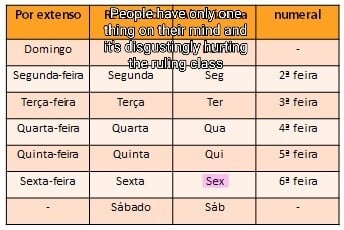Portuguese day names are the only ones that make sense.
196
Be sure to follow the rule before you head out.
Rule: You must post before you leave.
I think monday is really cool in hungarian. Its "hétfő" where "hét" means "seven" but as the week has seven days it also means "week" and "fő" means "head" or "main". Quite a lot of etymology in a small and common word and the nice part is people today still understand the meaning of it.
So head-of-the-week and also main-of-seven?
.... I like it. It's a bit less dryly practical than just calling it "Second Day" (because we start the count at sunday because christianity), but -- It makes sense and is even kinda cool.
Lots of other languages have days named after the sun, moon, and 5 planets or the gods associated with the planets. Obviously we have Sunday and Monday, or lunes in Spanish, but that's also why in Spanish, Mars = Marte, Tuesday = Martes. Probably most famously in English is Thursday coming from Thor's day (Þunras dag) with Thor being the equivalent to Zeus or Jupiter, which is where jueves comes from in Spanish. In Spanish though their sun-day got remained to God's day (domingo) and saturn-day to sabbath (sabado). Probably most interesting is that the connection even applies to Japanese. The days go in this order: 日月火水木金土 which means "sun moon fire water wood metal earth" which are the classical Chinese 5 elements connected to everything from the 60-year sexagisimal calendar to the bagua tao trigrams on the Republic of Korea flag. And if course, they're also the names of the planets with Mars being fire-planet, Mercury being water-planet, Jupiter being wood-planet, Venus being metal-planet, and Saturn being earth-planet.
So the planet Jupiter (etc.) is to some degree represented in the Thursdays (etc.) of three different languages. Not really saying that this makes more sense than Portuguese, but I think it's cool
I'm more confused why the British start counting week from Sunday.
Specifically, Friday in Japanese translates to Gold Day, which also has a lot of cultural connotations with it being the lucky day of the week
I'm entirely aware of that.
I also think it's fucking stupid.
I've learned english as a little kid. It's been more than 20 years.
I've been formally considered "fluent" on it since I was 17, so 13 years ago.
I have never properly learned the weekday names in english. I also patently refuse.
Why isn't TWOsday the second? Why is there a fried day? Is that the only day you're allowed to eat deep fried foods?
Just number your days instead of using weird mythological names that reference gods you don't even worship anymore and used to kill people for woshipping. ****ing gringos.
Days of the week in Spanish follow almost the exact same pattern as they do in English, with the exception of the weekend.
I know.
Aaaand it's bloody stupid there as well. :D
Except for the missing first and seventh day. Also if you're north western European centric you might have a problem when naming starts on Sunday. Segundo is dinsdag in my mind.
I'll let Sábado and Domingo because they at least reference christianity (a religion that is still widely practiced in the portuguese-speaking world) as opposed to using names of gods no one has worshipped for centuries (like english and spanish do) -- And those days are days of special observations in said religion -- So it makes some semblance of sense.
Fair point on the gods thing but in my language (and also English and German and probably some others) there's one named for the Sun and one for the moon. But yeah I like that the Portuguese don't really make it too complicated or random and just number the days.
I'm an immigrant in Brazil and Portuguese was the third language I learned and I still need to think of all the days of the week if I need to remember Wednesday or Thursday.
On work i like to write the week day in the 3 letter format, so for a good amount of time almost every friday, then i would look to my friend, point to the notebook and say "sex"
i speak the language in this graph, but i don't think i understand
People have only sex in their minds
oh! i've just noticed, today is sex
The ruling class only hates sex when people use it for enjoyment instead of creating more workers.
Are these representing days of the week or ordinal numbers? These are all cognates in Spanish but I don't see the connection
Week days in Portuguese, start in Sunday goes to Saturday.
So why do you use numbers? Domingo and sábado make sense as they're the same in Spanish
Because catholicism, the roman language names came from pagan gods, and the Portuguese wanted to distance from that. Sunday and Saturday keep their romance name because it had catholic/Jewish religious origin already.
The number 8 in Burmese is “shit”
